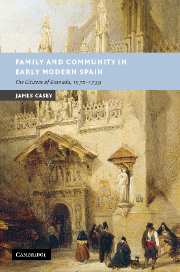Book contents
- Frontmatter
- Contents
- List of maps and tables
- Acknowledgements
- List of abbreviations
- Map 1 The Kingdom of Granada. Based on Manuel de Terán Geografia regional de España (Barcelona 1968)
- Map 2a The City of Granada (NW). Drawn by the architect Ambrosio de Vico (1596)
- Map 2b The City of Granada (SE). Drawn by the architect Ambrosio de Vico (1596)
- Introduction
- 1 Knights and citizens
- 2 Nobles of the doubloon
- 3 Lords of Granada
- 4 The web of inheritance
- 5 The network of marriage
- 6 Blood wedding
- 7 Cradle of the citizen
- 8 The shadow of the ancestors
- 9 The spirit of the clan
- 10 The law of honour
- 11 Good Commonwealth men
- 12 Defenders of the Fatherland
- 13 Conclusion
- Genealogical tables
- Bibliography
- Index
- NEW STUDIES IN EUROPEAN HISTORY
12 - Defenders of the Fatherland
Published online by Cambridge University Press: 06 August 2009
- Frontmatter
- Contents
- List of maps and tables
- Acknowledgements
- List of abbreviations
- Map 1 The Kingdom of Granada. Based on Manuel de Terán Geografia regional de España (Barcelona 1968)
- Map 2a The City of Granada (NW). Drawn by the architect Ambrosio de Vico (1596)
- Map 2b The City of Granada (SE). Drawn by the architect Ambrosio de Vico (1596)
- Introduction
- 1 Knights and citizens
- 2 Nobles of the doubloon
- 3 Lords of Granada
- 4 The web of inheritance
- 5 The network of marriage
- 6 Blood wedding
- 7 Cradle of the citizen
- 8 The shadow of the ancestors
- 9 The spirit of the clan
- 10 The law of honour
- 11 Good Commonwealth men
- 12 Defenders of the Fatherland
- 13 Conclusion
- Genealogical tables
- Bibliography
- Index
- NEW STUDIES IN EUROPEAN HISTORY
Summary
The great bankruptcy of Philip II in 1575, symptom of the ever-increasing cost of modern warfare in the age of gunpowder and global empires, may stand as a kind of turning point in the development of the state in Castile, requiring the forging of a new relationship between the centre and the periphery, the court and the country. The eighteen cities of Castile began to be summoned more frequently to the Cortes or parliament so that they could be persuaded or bullied into voting more taxes. Money, everyone could now agree, was the ‘sinews of war’ and the deputies sought to find a way of reconciling the needs of the state with the welfare of the population.
Underlying the debates of the time was the realisation that standing armies and high taxes were here to stay. An older concept of the república or commonwealth as owing only a limited support to the estado, the ‘estate’ of the sovereign, now began to break down, as economists and statesmen increasingly emphasised the interaction between the two: a strong king was needed for a strong kingdom. As one of the first of the arbitristas, Martín González de Cellorigo, put it in 1600: ‘The common people (that many-headed, restless thing) and its spokesmen allege that we could get the country back on its feet by abolishing taxes and cutting the public debt, without reflecting that not only the king suffers thereby, but the kingdom as well.’
- Type
- Chapter
- Information
- Family and Community in Early Modern SpainThe Citizens of Granada, 1570–1739, pp. 266 - 286Publisher: Cambridge University PressPrint publication year: 2007



